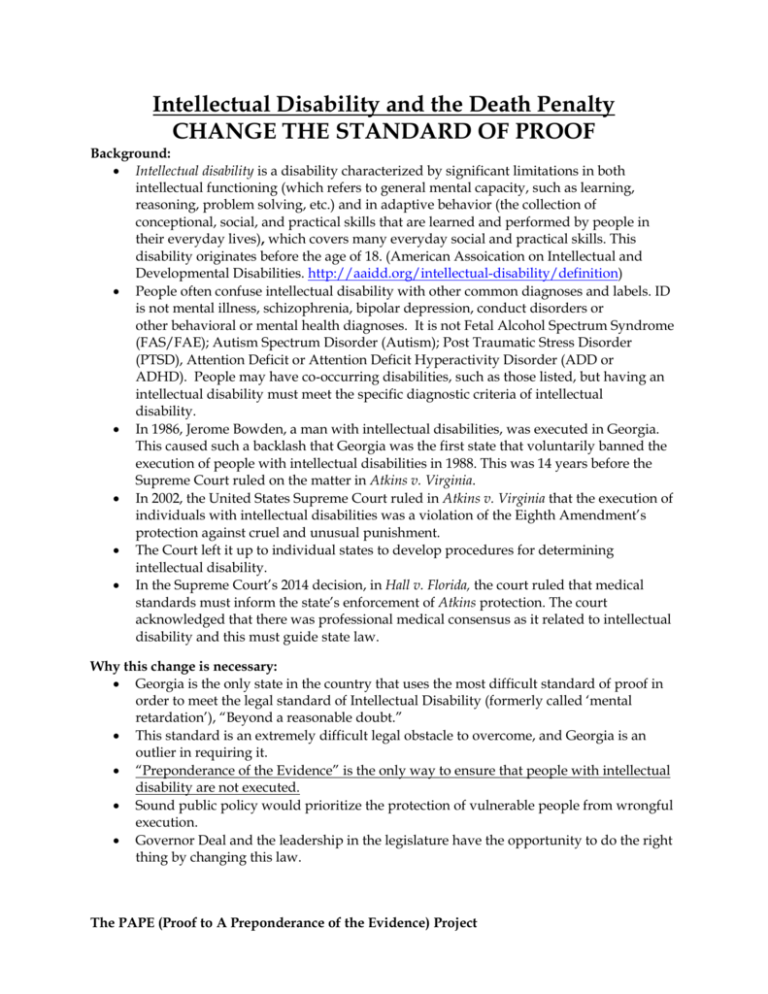here - Georgia Council on Developmental Disabilities
advertisement

Intellectual Disability and the Death Penalty CHANGE THE STANDARD OF PROOF Background: Intellectual disability is a disability characterized by significant limitations in both intellectual functioning (which refers to general mental capacity, such as learning, reasoning, problem solving, etc.) and in adaptive behavior (the collection of conceptional, social, and practical skills that are learned and performed by people in their everyday lives), which covers many everyday social and practical skills. This disability originates before the age of 18. (American Assoication on Intellectual and Developmental Disabilities. http://aaidd.org/intellectual-disability/definition) People often confuse intellectual disability with other common diagnoses and labels. ID is not mental illness, schizophrenia, bipolar depression, conduct disorders or other behavioral or mental health diagnoses. It is not Fetal Alcohol Spectrum Syndrome (FAS/FAE); Autism Spectrum Disorder (Autism); Post Traumatic Stress Disorder (PTSD), Attention Deficit or Attention Deficit Hyperactivity Disorder (ADD or ADHD). People may have co-occurring disabilities, such as those listed, but having an intellectual disability must meet the specific diagnostic criteria of intellectual disability. In 1986, Jerome Bowden, a man with intellectual disabilities, was executed in Georgia. This caused such a backlash that Georgia was the first state that voluntarily banned the execution of people with intellectual disabilities in 1988. This was 14 years before the Supreme Court ruled on the matter in Atkins v. Virginia. In 2002, the United States Supreme Court ruled in Atkins v. Virginia that the execution of individuals with intellectual disabilities was a violation of the Eighth Amendment’s protection against cruel and unusual punishment. The Court left it up to individual states to develop procedures for determining intellectual disability. In the Supreme Court’s 2014 decision, in Hall v. Florida, the court ruled that medical standards must inform the state’s enforcement of Atkins protection. The court acknowledged that there was professional medical consensus as it related to intellectual disability and this must guide state law. Why this change is necessary: Georgia is the only state in the country that uses the most difficult standard of proof in order to meet the legal standard of Intellectual Disability (formerly called ‘mental retardation’), “Beyond a reasonable doubt.” This standard is an extremely difficult legal obstacle to overcome, and Georgia is an outlier in requiring it. “Preponderance of the Evidence” is the only way to ensure that people with intellectual disability are not executed. Sound public policy would prioritize the protection of vulnerable people from wrongful execution. Governor Deal and the leadership in the legislature have the opportunity to do the right thing by changing this law. The PAPE (Proof to A Preponderance of the Evidence) Project What it isn’t: It is important to realize that this would only apply to those facing the death penalty. This bill will NOT apply to other felonies, and it will not apply to anyone currently on death row. Why Preponderance of the Evidence: Simply reducing the standard one step to “Clear and Convincing Evidence” will not ensure that no person with an intellectual disability will be executed because that standard of proof is still too stringent to provide sufficient guarantees, and only reduces that possibility slightly. It does not eliminate it. Right now there are 5 jurisdictions (Arizona, Colorado, Delaware, Florida and North Carolina) using “Clear and Convincing” as their standard, and 22 using “Preponderance of the Evidence,” while Georgia is the outlier with “Beyond a Reasonable Doubt.” (Note: Kansas, Montana, New Hampshire, Oregon and Wyoming do not have a specific standard of proof) Other jurisdictions using the “Preponderance of the Evidence” standard include: Alabama, Arkansas, California, Idaho, Indiana, Kentucky, Louisiana, Mississippi, Missouri, Nebraska, Nevada, Ohio, Oklahoma, Pennsylvania, South Carolina, South Dakota, Tennessee, Texas, Utah, Virginia, Washington and the U.S. Federal Government. About the PAPE (Proof to a Preponderance of the Evidence) Project: The PAPE (Proof to a Preponderance of the Evidence) Project is a coalition led by the Georgia Council on Developmental Disabilities, Georgians for Alternatives to the Death Penalty, and Georgia Catholics Against the Death Penalty. The Coalition will advocate for a bill during the 2016 legislative session that will change the current standard of proof to the "Preponderance of the Evidence" in death penalty cases involving people with intellectual disabilities. For more information or to get involved, please contact: Georgians for Alternatives to the Death Penalty http://www.gfadp.org info@gfadp.org (404) 749-6889 Georgia Council on Developmental Disabilities http://www.gcdd.org (404) 657-2126 Georgia Catholics Against the Death Penalty http://www.gacadp.org/ info@gacadp.org (404) 920-7357 The PAPE (Proof to A Preponderance of the Evidence) Project






